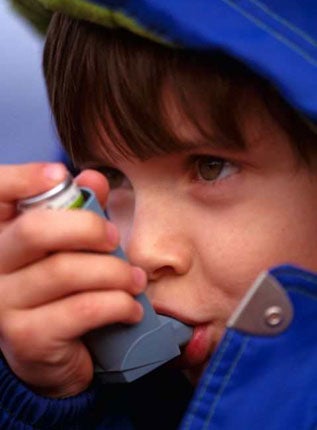Increase in asthma linked to Caesareans
Eight-year study of 3,000 children finds 80 per cent rise in risk

Your support helps us to tell the story
From reproductive rights to climate change to Big Tech, The Independent is on the ground when the story is developing. Whether it's investigating the financials of Elon Musk's pro-Trump PAC or producing our latest documentary, 'The A Word', which shines a light on the American women fighting for reproductive rights, we know how important it is to parse out the facts from the messaging.
At such a critical moment in US history, we need reporters on the ground. Your donation allows us to keep sending journalists to speak to both sides of the story.
The Independent is trusted by Americans across the entire political spectrum. And unlike many other quality news outlets, we choose not to lock Americans out of our reporting and analysis with paywalls. We believe quality journalism should be available to everyone, paid for by those who can afford it.
Your support makes all the difference.The rise in asthma in industrialised countries over the past 30 years may have been driven by an increase in Caesarean births, researchers report.
Babies born by Caesarean delivery are more likely to develop asthma than those delivered naturally, doctors say. Exposure to bacteria in the vagina during birth is thought to play a key role in priming the immune system, providing a defence against the development of allergies.
In Caesarean children, exposure to bacteria happens later and research has shown they have different intestinal flora – gut bacteria – suggesting the maturation of their immune systems is delayed.
A study of 3,000 children in the Netherlands who were followed until they were eight years old showed those born by Caesarean delivery were 80 per cent more likely to have developed asthma than those delivered traditionally.
Among the one in 10 children with two allergic parents, the incidence of asthma was three times higher among those born by Caesarean. These children have a strong inherited predisposition to the disease.
Caesarean rates have risen from 5 per cent of all births in the 1970s to more than 30 per cent in some regions of the world, as doctors have sought to reduce the risks of childbirth. In the UK the current Caesarean rate is around 22 per cent of all births.
Over the same period, asthma rates rose strongly until the mid-1990s. Official figures show the prevalence has since remained stable in many European countries, but some experts have disputed the accuracy of the data and claimed the condition is still increasing but the definition has changed.
Caroline Roduit of the National Institute for Public Health in Bilthoven, the Netherlands, who led the study published in Thorax, said: "Taking a global view over the last few decades it looks as if the asthma rate and the Caesarean rate are going in the same direction.
"It is true asthma rates appear to have stabilised in many European countries since the 1990s [while Caesarean rates have continued to increase]. But it is very difficult to get accurate data and it is different with children and with adults. It depends on the definition of asthma. There is a lot of discussion about whether it is stable or increasing."
Previous studies of the link between asthma and Caesarean delivery have produced conflicting results but the authors say the long monitoring period and the number of children involved strengthens the results. They add that the findings should be communicated to expectant mothers who are contemplating a Caesarean for social reasons, such as to fit in with a busy work schedule.
"The increased rate of Caesarean section is partly due to maternal demand without medical reasons. In this situation the mother should be informed of the risk of asthma for her child, especially when the parents have a history of allergy or asthma."
Join our commenting forum
Join thought-provoking conversations, follow other Independent readers and see their replies
Comments